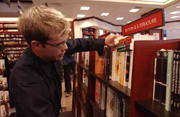The Penn lit scene's freshest face
Brian Cope, editor of Shrinkwrapped, created a new literary magazine with his own funding.
The Daily Pennsylvanian
November 15, 2001
He pulls out a slightly dog-eared, slim blue paper volume of the magazine. It doesn't look like much, but after a few moments of conversation with Brian Cope, the editor of Shrinkwrapped, one can't help but start flipping the pages.
For those who haven't walked by the magazine rack of the Penn Bookstore lately, the quarterly Shrinkwrapped is the newest Penn publication. In sharp contrast to most of the glossy covers featuring Britney Spears and other celebs, it comes packaged in a plain, unobtrusive cover, with no photos and no graphics -- just writing.
But what the magazine lacks in aesthetics, Cope and co-editor Shaleigh Kwok make up for in creativity.
Unhappy with the batch of literary magazines on the market, Cope set out to spice things up last year, when he was a College junior.
Cope has taken this year off to devote more time, energy and money to his creation.
"I wanted a magazine that came out more often, was published and edited by writers, and I thought we could have fun with it," Cope said. "We could make fun of ourselves and our writing."
Last summer, Cope nagged his friends for content to fill his new endeavor. But that was only half the battle.
"We had material, but we needed an angle," he said, finally coming up with a 'Choose Your Own Adventure' format. The magazine's poems and stories force the reader to become active and make choices at the end of each piece.
As for the plastic-covered title, the staff insists it simply wanted something lighthearted.
"It's just a random name," he said. "It's fun and unpretentious."
The Penn Bookstore isn't the only place stocking the magazine. Four-hundred copies of the first issue are also scattered between the Penn Book Center, A House of Our Own and a few campus coffee houses.
The Kelly Writers House has supported Shrinkwrapped from the get-go.
"In 1995, when the Writers House formed, we were committed to being a manuscript incubator," Writers House Director Al Filreis said. "We do stuff that's out of the curriculum to create a literary community. And [Shrinkwrapped] is a good example of this."
Cope said he is confident that the magazine, which costs $700 per issue to produce but is available free of charge, will run for at least a year, but he doesn't have funds beyond that point.
"This magazine is self-financed, which basically means that I pay for it," Cope said.
The staff is currently looking into both grants and advertising for financial support. They are hesitant to approach the Student Activities Council, though.
"We like the freedom we maintain," Cope said. "We don't have to have a constitution or a board. Also, working through Writers House gives us more of a community, rather than just a campus, feel."
The January issue will allow readers to choose from a buffet of literature, where they can sample a multi-course narrative or perhaps a side of poetry.
"The table of contents will feature a list of foods -- cheeseburger, page 10; mocha, page 16; five-course meal, page 23," Cope said. "We want the consumption value of the food to be equivalent to the value of the writing. We want to tell people, if you have enough time for a cheeseburger, you have enough time for a quick poem."
After the release of the second issue next February, the staff will hold a reading at the Writers House, throwing the mag out to the community and giving readers a chance to match names with faces.
Despite the newfound competition, members of other campus literary magazines feel there's enough room on the shelves for everyone.
"We want to see as much interest in writing as possible." said College senior Joshua Gruber, the assistant editor of Penn Review. "Shrinkwrapped more selectively goes after writers who have the skills they want to publish. Ours is an outlet for just about anyone."
Penelope Thomas, a College sophomore and editor of the Asian-American literary magazine Mosaic, claims her publication fills a different niche.
"Mosaic is more focused toward a specific group on campus," Thomas said. "We want to let the campus be aware of Asian issues and culture."
Despite the struggles that may occur, Cope insists that the magazine's current price -- or lack thereof -- will not change.
But Cope doesn't mind the sacrifices. He's already quit his nicotine habit to help finance the magazine.
"Now, seeing someone picking up a copy of the magazine is just as satisfying as a pack of cigarettes," he said.

